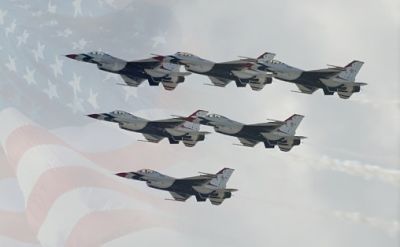 The U.S. Air Force Officer Training School (OTS) is located at Maxwell Air Force Base in Montgomery, Ala. The nine-and-a-half-week program prepares potential commissioned officers of the Air Force to assume the responsibilities of an officer upon graduation. Attendance of OTS is limited to civilians and enlisted service members who have a four-year college degree.
The U.S. Air Force Officer Training School (OTS) is located at Maxwell Air Force Base in Montgomery, Ala. The nine-and-a-half-week program prepares potential commissioned officers of the Air Force to assume the responsibilities of an officer upon graduation. Attendance of OTS is limited to civilians and enlisted service members who have a four-year college degree.
Air Force OTS – The Basics
Air Force OTS is a nine-and-a-half-week course that develops future commissioned officers of the Air Force through an intense program based on academics, physical training, and personal and professional development. To be accepted into the program, candidates must pass the Air Force Qualifying Test, a physical and mental screening exam, and a selection board – all of which are designed to evaluate a candidate’s leadership potential, moral standards, and academic strength.
Upon completion of Air Force OTS, graduates are commissioned at pay grade O-1 (Second Lieutenant).
Air Force OTS Phases
The Air Force OTS program is divided into four distinct phases. Following is a brief overview of the training during each phase of OTS:
Phase 1: Indoctrination
The first phase of Air Force OTS focuses on teamwork, discipline, and standardization with an emphasis on leadership fundamentals, military management, and Air Force culture.
| TRAINING | ACADEMICS |
|---|---|
| Blue-Line Ceremony | Academic Orientation |
| In-processing | Military Customs and Courtesies |
| Uniform Purchase | Profession of Arms |
| Dorm Instruction | Air Force Leaders |
| Confidence Course | Airman’s Creed |
| Project X | Personal and Group Goals |
| Physical Training |
Phase 2: Development
Building on the Indoctrination phase, the second phase focuses on learning Air Force history, basic combat skills, and the importance of cross-cultural competence in relation to the Air Force mission.
| TRAINING | ACADEMICS |
|---|---|
| M-9 Weapons Qualifications | Military Briefings |
| Basic Expeditionary Leadership Problem Solving | Airpower from Pre-World War I to Present Day |
| Air Force Combatives Program (hand-to-hand combat) | Handling Culture Shock Effectively |
| Military Law | |
| Leadership Authority and Responsibility | |
| Standards and Accountability |
Phase 3: Application
As the name implies, phase three of OTS incorporates practical application of the knowledge gained during the first two phases. Candidates will have the opportunity to apply their leadership skills by training the new lower class and lead peers through officer trainee wing positions. Additionally, candidates will be required to pass leadership evaluations in order to advance to the next phase.
| TRAINING | ACADEMICS |
|---|---|
| Assault Course | Leadership and Management Case Studies |
| Small-Unit Tactics | Group Dynamics |
| Preparation for the Arrival of the Lower Class | Professional and Unprofessional Relationships |
| Leadership Reaction Course | Advocacy Briefing Measurement |
| Base Defense Field Exercises | Air and Space System Capabilities |
Phase 4: Transition
Culminating in graduation from OTS, phase four focuses on mentorship and the transition into becoming an Air Force officer.
| TRAINING | ACADEMICS |
|---|---|
| Air Expeditionary Force Exercise | Army, Navy, Marine Corps Panel |
| First Officer Assignment | Oath of Office |
| Career Day | Senior Officer Perspective |
| Dining Out | Financial Briefing |
| Graduation |
How to Apply
Civilians applying to attend Air Force OTS must have a bachelor’s degree and be a U.S. citizen between the ages of 19-39 years old. To be accepted into the program, candidates must pass the Air Force Qualifying Test, a physical and mental screening exam, and a selection board.
To apply, contact your nearest Air Force recruiter.
Active duty, enlisted Airmen applying to attend OTS must have a bachelor’s degree and be a U.S. citizen between the ages of 19-39 years old. Enlisted personnel interested in attending OTS must have the approval of their unit commander.
Learn more about Air Force Officer Training School.
Kristen Baker-Geczy is a communications specialist, active duty military spouse, and former MWR marketing coordinator. She was also deployed to Southwest Asia as an Air Force contractor.